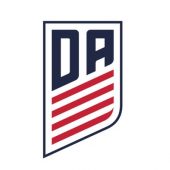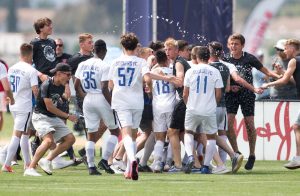
The US Soccer Development Academy (USSDA) is the highest competition platform for youth players in the US. Clubs have to meet certain criteria including quality of coaching staff, facilities, and club organization to be selected as USSDA club. Sockers FC Chicago is proud to be a founding member for the inauguration for both the Boys DA (2007) and the Girls DA (2017)..
The U.S. Soccer Development Academy impacts everyday club environments to develop world-class players.
What is the Development Academy Program?
Following a comprehensive review of elite player development in the United States and around the world, U.S. Soccer created the Development Academy in 2007. The Academy Program’s philosophy is based on increased training, less total games, and more meaningful games using international rules of competition.
In the Fall of 2017, the Academy expanded programming to include a Girls’ Development Academy. The Academy has 197 total clubs, comprised of teams across six age groups in the boys program: U-12, U-13, U-14, U-15, U-16/17, and U-18/19 and four age groups in the girls program: U-14, U-15, U-16/17, and U-18/19.
The Academy Program focuses on positively impacting everyday club environments to assist in maximizing youth player development across the country. The Academy values individual development of elite players over winning trophies and titles. The Academy sets the standard for elite environments for youth soccer clubs nationwide and is a part of U.S. Soccer’s global leadership position in youth soccer that will impact thousands of players.
U.S. Soccer’s new Player Development Initiatives (PDIs) are geared towards giving players the right tools to succeed and develop to the best of their abilities in age appropriate environments.
Program Benefits
For Players
Age Groups
The Development Academy Program features combined age groups where identified players can “play up” within the club structure, as encouraged by U.S. Soccer Technical Staff.
- Please note the Academy will not adopt the Birth Year Mandate until the 2017 season.
- For example, the U-17/18 team should include a balanced mixture of 18-year-olds, 17-year-olds and a few exceptional 16-year-olds.
Consistent Training Environments
Development Academy clubs are required to train a minimum of four (4) days per week [three (3) days per week for ages U-14 and below*] and rest one (1) day per week during the Academy season.
*Although the Academy requires U-14 and below to train a minimum of three days a week, it is strongly recommended that players train a minimum of 4 days per week with their club.
Fewer, More Meaningful Games
Each Academy team plays approximately 25-30 league games, including 6-9 games played at Showcases. Teams that advance from the Academy Playoffs could expect to play up to three (3) additional games.
Our game-to-training ratio ensures our players are getting adequate rest. Teams may have one (1) or two (2) games per weekend based on travel, with no more than one game per day.
No Outside Activity/Competitions
To maintain a focus on club training environments, Academy players and teams do not play in any outside competitions without written permission from the U.S. Soccer Development Academy staff. This includes any other leagues, tournaments, State Cup competitions, ODP or All-Star events. Development Academy players for all teams must choose to participate in the Academy full-time and forgo playing for their high school teams.
Full-time Academy players can only participate on their designated Academy team, with only two exceptions: U.S. Soccer Training Centers and Youth National Team duty.
The Development Academy upholds this rule because we believe elite players require world class environments. The Development Academy’s 10-month Program allows for a greater opportunity to institute style of play and implement a system according to U.S. Soccer’s Development Philosophy. It also gives teams increased opportunities for younger kids in their club to “play up” against older players in both training and matches, thereby accelerating their development.


